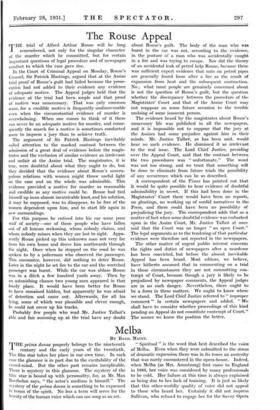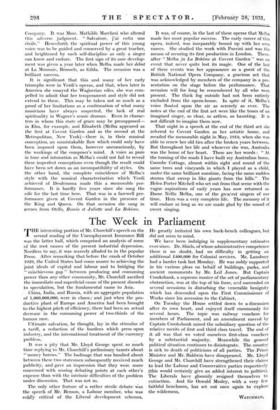Melba
By BASIL MAINE.
T' prima donna properly belongs to the nineteenth century and the early years of the twentieth. The film star takes her place in our own time. In each case the glamour is in part due to the excitability of the crowd-mind. But the other part remains inexplicable. There is mystery in this glamour. The mystery of the film star is bound up with personality, for, as Mr. Max Beerbohm says, "the actor's medium is himself." The mystery of the prima donna is something to be expressed M terms of the spirit. No less a term 'will serve for the beauty of the human voice which can use song as an Art.• " Spiritual " is the word that best described the voiee of Melba. Even when they were submitted to the stress of dramatic expression there was in its tones an austerity that was rarely encountered in the opera-house. Indeed, when Melba (as Mrs. Armstrong) first came to England in 1886, her voice was considered by many professionals to be cold. Her failure at this time is always explained as being due to her lack of training. It is just as likely that this other-worldly quality of voice did not appeal to those who heard her. Certainly it did not impress Sullivan, who refused to engage her for the Savoy Opera Company. It was Mme. Mathilde Marchesi who altered this adverse judgment. "Salvatore, j'ai enfin une etoile." Henceforth the spiritual power of this young voice was to be guided and conserved by a great teacher, and heightened by such self-discipline as only a singer can know and endure. The first sign of its sure develop- ment was given a year later when Melba made her debut at La Monnaie, Brussels, as Gilda. The occasion was a brilliant success.
It is significant that this and many of her early triumphs were in Verdi's operas, and that, when later in America she essayed the Wagnerian roles, she was com- pelled to admit that her temperament and style did not extend to these. This may be taken not so much as a proof of her limitations as a confirmation of what many musicians have always suspected, the lack of real spirituality in Wagner's music dramas. Even in charac- ters in whom this state of grace may be presupposed— in Elsa, for example, and Elisabeth (Melba appeared as the first at Covent Garden and as the second at the Metropolitan, New York)—there is, in their musical conception, an unmistakable flaw which could only have been imposed upon them, however unconsciously, by the workings of the composer's mind. A voice as pure in tone and intonation as Melba's could not fail to reveal these imperfect conceptions even though the result could have been set down as an incompatibility of styles. On the other hand, the complete coincidence of Melba's style with the musical characterization which Verdi achieved of Desdemona made this a memorable per- formance. It is hardly five years since she sang the role for the last time here. That was in a farewell per- formance given at Covent Garden in the presence of the King and Queen. On that occasion she sang in scenes from Otello, Romeo et Juliette and La Boheme. It was, of course, in the last of these operas that Melba made her most popular success. The early career of this opera, indeed, was inseparably bound up with her own career. She studied the work with Puccini and was the means of securing its first production in London. There- after "Melba in La Boheme at Covent Garden" was an event that never quite lost its magic. One of the last of these events was her appearance as a guest of the British National Opera Company, a gracious act that • was acknowledged by members of the company in a pre- sentation on the stage before the performance. That occasion will for long be remembered by all who were present. The thick fog outside had not been entirely excluded from the opera-house. In spite of it, Melba's voice floated upon the air as serenely as ever. The notes at the end of the first act were like the tones of an imagined singer, so clear, so artless, so haunting. It is not difficult to imagine them now.
That night in a speech at the end of the third act she referred to Covent Garden as her artistic home, and recalled the memorable night in May, 1919, when she was able to renew her old ties after the broken years between. But throughout her life and wherever she was, Australia was the home of her heart. These are her words : "At the turning of the roads I have built my Australian home, Coombe Cottage, almost within sight and sound of the same trees and vineyards in which I played as a child, under the same brilliant sunshine, facing the same sudden storms that sweep in like giants from the hills." The Helen Porter Mitchell who set out from that scene with the vague aspirations of early years has now returned as Dame Nellie Melba, one of the gate-est singers of our time. Hers was a very complete life. The memory of it will endure as long as we are made glad by the sound of sweet singing.












































 Previous page
Previous page